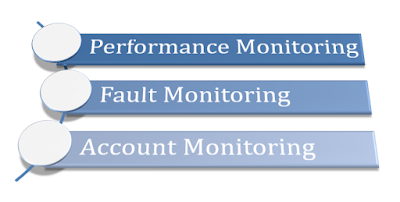Open Network Monitoring System (OpenNMS) is a service-grade,
enormously integrated, open source platform designed for building network
monitoring solutions. There are two distributions of OpenNMS: Meridian and
Horizon.
Meridian is advisable for organizations and businesses
looking out for stability and long-term support. Horizon is suggested for quick innovations and is
right for monitoring new technologies and IT ecosystems. Both distributions are
completely open-source.
Network monitoring is vital to keep computer networks and
programs secure from the various cyber attacks that are so common in recent
times. This article presents the purpose for network monitoring, along with a
few select open source network monitoring tools.
Network monitoring is used to maintain an eagle’s eye on
different computer networks, looking out for sluggish and failing components.
It is pretty essential, specifically in case of sudden outages and other
troubles. Network monitoring is taken into consideration as to be part of
network control. Enterprise networks must cope with large data sets being
accessed by various devices. Such networks should provide a reliable and fast
service that doesn't add too much value to the business.
The demand for open source software tools continues to grow
and network management tools have ridden that wave. Instead of spending a small
fortune purchasing software tools which might or might not do what you need,
look out for a free open source tool to monitor, configure and map your networked
devices.
Basic goals
of network monitoring
There are 3 fundamental goals for network monitoring, which
cover three functional areas for network management, based on the Open Systems
Interconnection (OSI) model.
1.
Performance Monitoring
This arrangements with estimating the execution of a system.
There are multiple measurable parameters in a network. But from the list of
parameters, relevant ones should be selected from the business value and
performance perspective. Such parameters to be measured are known as a network
since they indicate the performance attributes of the network.
2. Fault Monitoring
This arrangements with identifying the issues or issues in
the system.. It covers the special layers of the network because a problem can
arise in any one of them. It requires establishing the ‘normal’ traits for the
network. There are always a few errors inside the network, however, this does
not imply that the network has persistent problems.
3. Account Monitoring
This deals with how
any person makes use of a specific network. The network keeps a record of all
of the devices on it, which are utilized by people and additionally how often
they are used. This sort of records is normally used for billing users for network
usage and also for predicting future network utilization.
Different Open-source Tools used for Network Monitoring
Not only are there free and open source network monitoring
solutions available, but the options are also diverse and abundant. Below, I’ve mentioned a few of the most popular free network
monitoring software:
- Nagios
- Zabbix
- Incinga
- Libre
NMS
- Pandora FMS
While it is conceivable
to physically screen a system (contingent upon the measure of the system and
how basic the assets on the system are), you will presumably be in an ideal
situation utilizing apparatuses particularly intended for such a reason.
IBM® Network Performance Insight software tool to view and
configure the performance analysis reports for a network
Network Performance Insight is a
Dashboard Application Services Hub - based network monitoring tool by IBM that
gives you a complete traffic flow and metric data analysis. The movement perception dashboards are
rendered from Network Health Dashboard and Device Dashboard after you
coordinate with IBM Tivoli® Network Manager IP Edition.
IBM Networks for Operations Insight is an
optional feature which can be included in the deployment of the base IBM
Netcool Operations Insight solution. The capabilities of Networks for
Operations Insight include network discovery, visualization, event correlation
and root-cause analysis, and configuration that provide service assurance in
dynamic network infrastructures.
What Network Monitoring Tools do you use? Feel free to share your views in the comment section.
Guest Post


0 comments:
Post a Comment